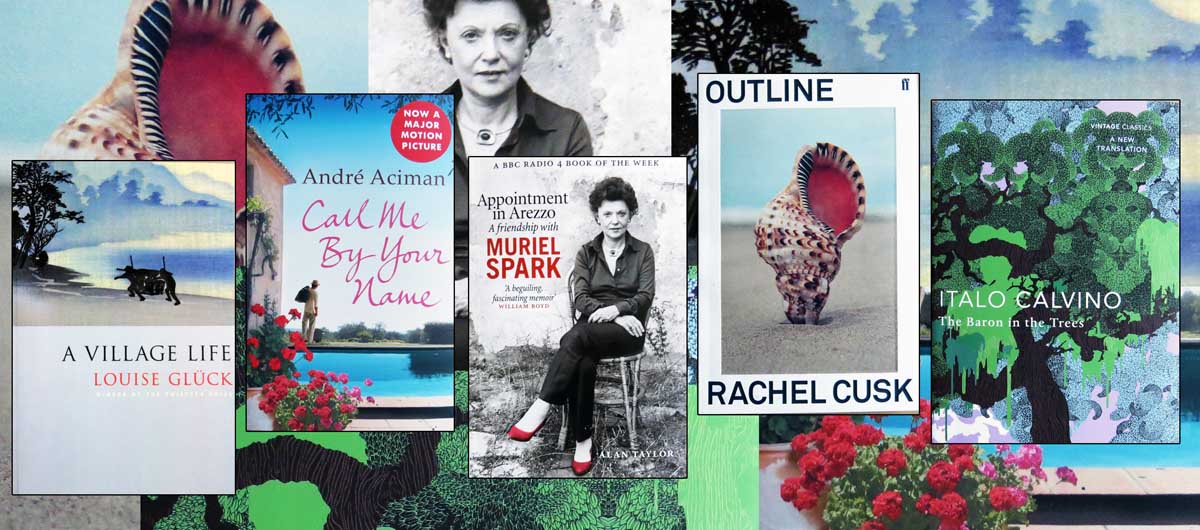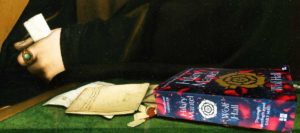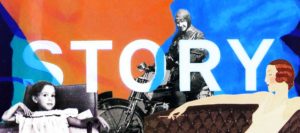This is a reading diary entry about what I’m calling my “Mediterranean Quintet”, and a few other titles.
To Long Didn’t Read – jump to a list of the books with URLs
Last summer I came across an article on the Internet recommending “hot summer books” to read. I’d already read several on the list, though the only title of those that I now remember is Heat and Dust by Ruth Prawer Jhabvala. But among the titles that were new to me, two sounded particularly interesting and I put in an order for them: André Aciman’s Call Me by Your Name, and Outline by Rachel Cusk.
Because I didn’t get round to reading them immediately, these two joined my waiting to be read pile, and all through the autumn I would catch sight of their spines wherever I looked at the shelf. Come our long, locked-down winter, and especially when it turned bitter and cold in January, hot summer books became increasingly attractive.
Mediterranean
Both Call Me by Your Name and Outline are Mediterranean books – the one set in Italy the other in Athens. By a fluke, several of my other winter reads were also set in that part of the world. Appointment in Arezzo takes place largely in Italy. Italo Calvino’s The Baron in the Trees is set in Savoy, on the border between Italy and France. And the village of A Village Life is, I think, a Mediterranean one, perhaps French, perhaps Italian, perhaps even Spanish. I picked up these latter two books browsing in my most interesting nearby bookshop. Nothing planned, but happy coincidence.
It’s certainly true to say that summer heat vibrates through a part of all of these books, and thoroughly infuses the first two. At the same time, it’s not a core element in any of them.
Call me
Call Me by Your Name is about love, adolescent infatuation, sexual and particularly homosexual discovery, and moves in a society of highly educated, multilingual academics and their families. It’s narrated by Elio, who is looking back at his adolescence from the perspective of 20 years or so. Although it’s about homosexual (more correctly I suppose, bisexual) awakenings, it has a universal feel.
Elio combines the self-confidence and self-doubt of adolescence, the conviction and uncertainty that go hand in hand. One moment he thinks Oliver loves him, the next he believes the opposite. One moment he can interpret things Oliver says or does in one way, the next, swinging with his own changing emotions, he sees them in a completely contrary light. The confusion and delight of a teenage love affair is beautifully conveyed. And then the story leaps forward and the characters are middle aged and there is a huge poignancy in what happened to them. How they look back on their Italian summer together.
Outline
Outline is a character study of the narrator, though with almost no detail. It is an outline.
The novel is told largely through the narrator’s retelling of the stories of people she meets. On the flight to Athens she sits next to a man who tells her about himself. Later she meets him again and he takes her out on his boat, telling her revised version of his story.
She is working as a teacher of creative writing at a summer school. She has teaching colleagues, students, and she meets friends and friends of friends. Each of these people tell her stories about their own lives and in some way each story helps the reader form a perception of the narrator.
It’s quite a tour de force. I think the narrator’s name, Faye, appears just once in the whole 250-odd pages. Coming to this cold, I didn’t know anything about the book or the author. Apparently Outline is the first in a trilogy, so now I’m going to look out for the subsequent books, Transit and Kudos.
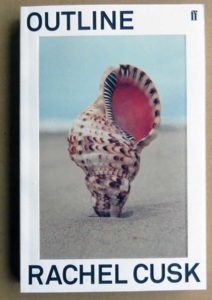
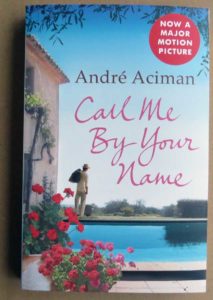
Sparks
A couple of years ago I picked up Girls of Slender Means by the Scots writer Muriel Spark. Spark is better known perhaps as the author of The Prime of Miss Jean Brodie. I wrote about Girls in a blog post a couple of years ago. About the style of writing. I must’ve gone on at some length about how impressed I was, because my sister’s Christmas present this year was Appointment in Arezzo: A Friendship with Muriel Spark by Alan Taylor. In a series of chapters Taylor paints a picture of Muriel Spark, her creativity and writing process and the home she made for herself with her friend Penelope Jardine in Arezzo.
Taylor, a Scottish journalist, editor and author, first met Spark when sent to interview her in 1990. They struck up a friendship, and he returned to visit her several times, sometimes with his family in tow. Sometimes also to house-sit while Spark and Jardine were travelling. They also met in New York and Edinburgh on different occasions. I find my copy now has rather a lot of pencil marks and asterisks scattered through it. Appointment in Arezzo is full of Sparkian quotes. Here’s one. Taylor asked her what she thought her achievement was, her legacy? She replied:
I have realised myself … have expressed something I brought into the world with me. I believe I have liberated the novel in many ways, showing how anything whatsoever can be narrated, any experienced set down, including sheer damn cheek. I think I have opened doors and windows in the mind, and challenged fears – especially the most inhibiting fears about what novel should be.
page 23, and again page 99
The Baron
The Baron in the Trees is a fantasy presented as an 18th-century biographical novel. It purports to tell the story of Cosimo Piovasco di Rondò, the son of a noble Ligurian family. At the age of 12, in 1767, following an argument with his parents, Cosimo climbs a tree in the garden and refuses to come down. He lives the rest of his life in the trees of the family estate and in neighbouring forests. From this perspective he observes and participates in the Enlightenment and the French Revolution. He corresponds with Rousseau and meets Napoleon. Rather than dying and falling to the ground, he disappears near the end of his life by grasping a rope trailing from a hot air balloon and flying away.
The book was originally published in Italian in 1957. First published in English in 1959, my edition is new, translated in 2017 by Ann Goldstein (of Eleana Ferrante fame). It’s a good read.
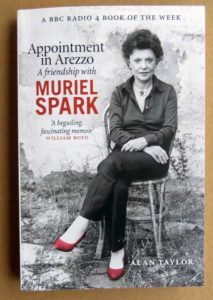
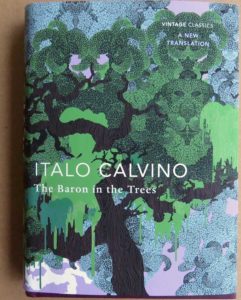
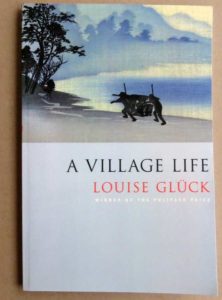
Return to A Village
The final book of my Mediterranean winter/summer, A Village Life, I wrote about a couple of weeks ago. Still, I’d like to add one thing more. It’s about how I chose to read the book. I made a point of stretching out the reading over a longer period; taking it slowly, flipping back and forth to re-read the poems. I feel I got more out of each of them, and found things to like sometimes in poems I didn’t liked so much on first reading.
On the other hand I think I probably spread it out too much. Towards the end I found myself getting a bit irritated. I didn’t enjoy the last four or five poems nearly as much a some of the earlier ones. The final poem in the book is the titular poem, and I’m not sure I gave it the attention it calls for, because I was so keen to get the book finished.
Maybe if I was to read another book of poetry in the same way I’d be better off reading two or three poems a day. Or having a couple of reading sessions every day instead of just one short session in the morning. It took me 29 days to read A Village Life, and that was too long.
Also…
Apart from these five titles, in the first couple of months of the year I completed The Mirror and the Light, the final volume of Hillary Mantel’s Thomas Cromwell series. I also read Agent Running in the Field by John Le Carré – his last novel and a welcome return to form, I thought. (I was disappointed by A Legacy of Spies.)
A Sense of Justice by Beryl Sabel tells the stories of Beryl’s mother and grandmother. Like my own grandma, Beryl’s grandmother had a connection to the East End Jewish anarchists around Rudolph Rocker.
I also read all the poems that were published in Childhood, the Winter 2020 edition of The Poet magazine. (Yes, all the poems. I even re-read my own poems and admired them for appearing in a magazine. It’s rather sad, I know.)
But that’s my first reading diary round-up of the year. Look for another in a couple of months. What are you reading?
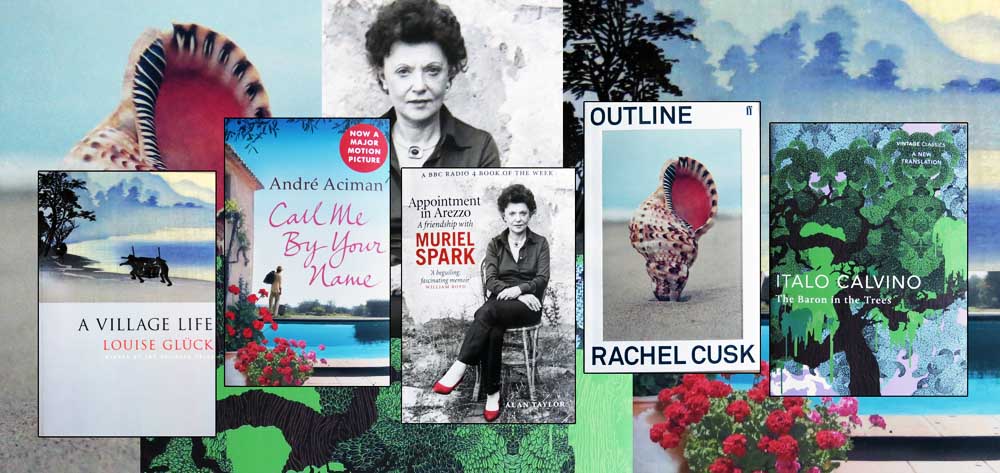
TLDR – all the books mentioned above
Author links go to the author’s home page or nearest equivalent where I can find one, books link to their entry on Wikipedia or GoodReads.
- Call Me by Your Name – André Aciman
- The Baron in the Trees – Italo Calvino (trans Ann Goldstein)
- Outline – Rachel Cusk
- A Village Life – Louise Glück
- Heat and Dust – Ruth Prawer Jhabvala
- Agent Running in the Field – John Le Carré
- The Mirror and the Light – Hilary Mantel
- Childhood (The Poet magazine, winter 2020)
- A Sense of Justice – Beryl Sabel | No links to share
- Appointment in Arezzo: A Friendship with Muriel Spark – Alan Taylor

